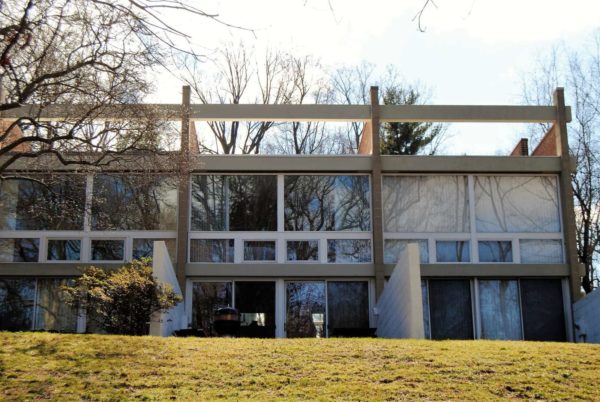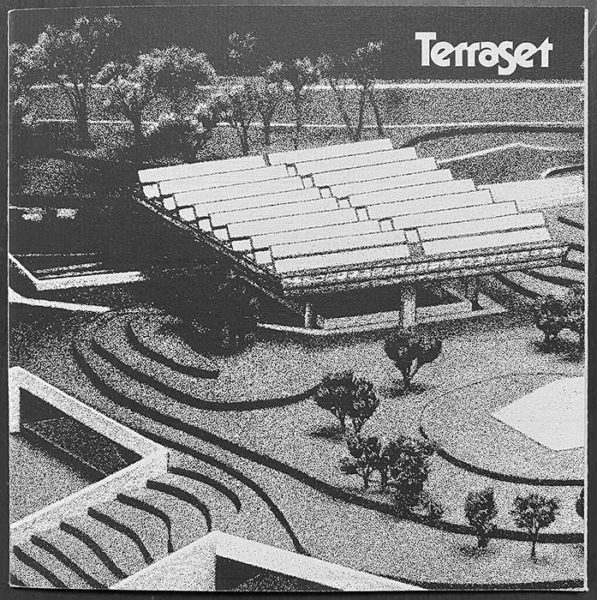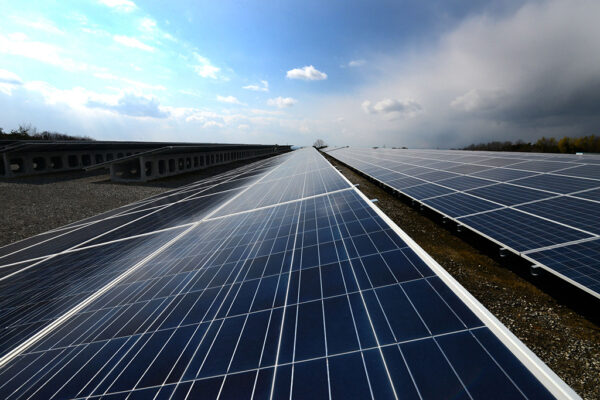
Fairfax County is continuing its efforts to transition to renewable energy with the installation of solar panels on county government and public school buildings, but it will now do so with a different vendor.
The county ended its contract with the company Sigora Solar yesterday (July 1), about 18 months ahead of schedule.
Sigora Solar is one of three vendors awarded contracts to install, manage, and maintain solar energy infrastructure for county government and school buildings in December 2019, when Fairfax County announced what it said was the largest solar power purchase agreement initiative by a Virginia locality to date.
The original contracts with Sigora, Sun Tribe Solar, and Ipsun Power were set to run through Dec. 31, 2022.
However, the county amended its contract with Sigora on June 10 to state that it would be “terminated for convenience” effective July 1. Sigora was designated as the primary contractor for roof-mounted solar panel projects.
Moving forward, the county will now work with Sun Tribe Solar, the secondary contractor for roof-mounted panels and the primary contractor for carport or canopy-mounted panels.
“Under the terms of the agreement, the county leases space on its buildings for the companies to install solar panels that those vendors will own, and the county buys the energy generated by the panels at a fixed price,” Brian Worthy, a public information officer with Fairfax County’s Office of Public Affairs, said.
“However, these companies have the right to decide whether or not to install panels at any buildings identified by the county,” Worthy said. “During the past year and a half, the county selected 30 buildings for solar panels, and we are eager to move forward with these projects.”
The Fairfax County Board of Supervisors has approved leasing necessary roof space at two batches of county-owned properties so far. The first round of eight sites came on Oct. 20, 2020, and another 22 sites were added on March 9.
The sites approved for solar panel installations in Reston are:
- Reston Fire Station (1820 Wiehle Avenue, Reston)
- The North County Government Center (1801 Cameron Glen Dr., Reston)
- Reston Community Center Hunter Woods (2310 Colts Neck Road, Reston)
- Great Falls Volunteer Fire Station (9916 Georgetown Pike, Great Falls)
Under the solar power purchase agreements, the installed solar panels will be owned, operated and maintained by the contracted vendors, rather than the county. The county will simply purchase electricity produced by these panels over time.
When the contracts were announced in 2019, the county estimated that the initiative could potentially yield over $60 million in electricity cost avoidance over the terms of the contracts. Additionally, it was projected that approximately 1.73 million megawatt hours of renewable energy could be generated at the county’s facilities.
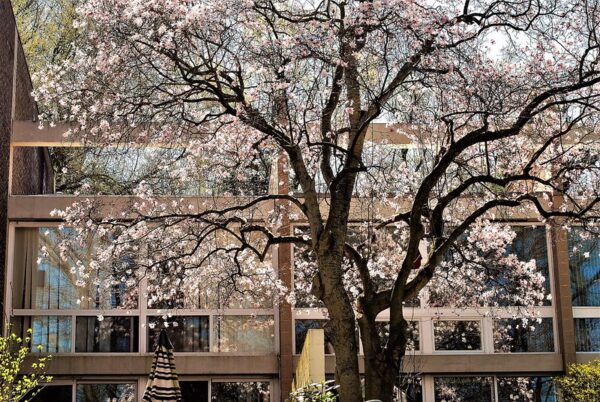
Hail Spotted During Evening Showers — Hail pelted Reston and Herndon last night when a rainstorm passed through the area around 7:45 p.m. The storm moved through fairly quickly but still made an impression. [Capital Weather Gang/Twitter]
Reston Association Annual Meeting Tonight — Reston Association will hold its annual members’ meeting virtually at 7 p.m. today. Member comments will be followed by an announcement of the results of the 2021 Board of Directors election and an introduction of the new directors. [RA]
Developers Undeterred by Silver Line Delays — The second phase of Metro’s Silver Line will not open until next year, but developers and local economic leaders still have a “positive long-term outlook” for the Reston and Herndon area. In the short term, though, the delays have “added challenges to those under construction and looking to break ground.” [Bisnow]
Fairfax County Joins Solarize Program Again — For the fifth year in a row, Fairfax County is participating in the Solarize Virginia program, which helps reduce costs for homeowners and businesses seeking to adopt solar power technology. This year’s program runs from April 12 through June 30, and for the first time, participants have the option to also install battery storage systems. [Fairfax County Government]
Outdoor “Twelfth Night” Production Coming to Herndon — The Herndon Community Arts Lab, Arts Herndon, and Dark Horse Theatre are putting on performances of Willian Shakespeare’s “Twelfth Night or What You Will” on the Arts Herndon Lawn Stage in Old Town this spring. There will be a “pay what you will” preview on April 23, followed by regular performances on April 24 and 25, and May 1 and 2. [Patch]
Local College Student Bombarded by Camel Calls — A college student was baffled by a rash of callers asking to buy a camel he didn’t have until he learned about a Craigslist post advertising a camel for sale in Fairfax County with his phone number. The legality of private camel ownership in the county is unclear. [DCist]
Photo via vantagehill/Flickr
Silver Line Extension Could Open Early Next Year — Phase two of the Silver Line is expected to open in early 2022, according to Metro’s general manager. The announcement comes after the Metropolitan Washington Airports Authority said it will be ready to turn the project over to Metro by Labor Day weekend. [WJLA]
County Hires Health Care Support — The county is hiring substitute and relief counselors as part of its efforts to combat the COVID-19 pandemic and administer vaccines. [Fairfax County Government]
More Solar Panels Coming to County Schools — The Fairfax County School Board voted to install solar panels on a number of school buildings in order to limit greenhouse gas emissions and improve efficiency. The school system plans to begin the project at three schools and eventually phase out to 87 sites. [Fairfax County Public Schools]
Public Hearings on Metro Budget Begin — A number of budget hearings begins this week. Metro is facing a major budget shortfall due to a dip in ridership. [Washington Metropolitan Area Transit Authority]
Northam Reflects on One Year of COVID-19 — Families, friends and neighbors are mourning the more than 9,000 Virginians who died in the coronavirus pandemic over the past year, Gov. Ralph Northam said Sunday in a video. Many others have lost jobs, income, a sense of security and knowing what would happen next as lockdowns and the virus turned life upside down. [Reston Patch]
Photo via vantagehill/Flickr
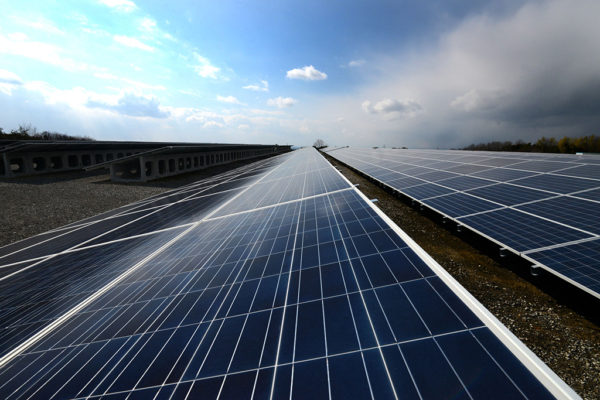
As Fairfax County moves to expand its use of renewable energy, the Board of Supervisors is looking for feedback on the next round of county facilities being considered for solar panel installations.
The board will hold a public hearing on Tuesday (March 9) to determine whether the county should lease roof space at 22 county-owned properties to the energy company Sigora Solar, which would be responsible for installing, operating, and maintaining solar photovoltaic panels at the sites.
Sites under consideration in the Tysons and Reston area include:
- McLean Government Center and Police Station (1437 Balls Hill Road)
- Wolf Trap Fire Station #42 (1315 Beulah Road)
- McLean Community Center (1234 Ingleside Avenue)
- Thomas Jefferson Library (7415 Arlington Boulevard)
- Merrifield Center and Kerrifield Center Garage (8221 Willow Oaks Corporate Drive)
- Reston Fire Station (1820 Wiehle Avenune)
- Great Falls Volunteer Fire Station (9916 Georgetown Pike)
This is the second set of properties that county officials have proposed as possible locations for solar panels. The county previously approved leases for roof space at eight sites, including the Providence Community Center, in October.
In an effort to pivot to renewable energy as a means of reducing greenhouse gas emissions, Fairfax County announced in December 2019 that it had awarded contracts to multiple solar power companies in what was the “largest solar power purchase agreement initiative by a local municipality in Virginia” at that time, according to the Fairfax County Office of Environmental and Energy Coordination.
In addition to Sigora Solar, the county has contracted with the providers BrightSuite — a subsidiary of Dominion Energy — and Ipsun Solar for the initiative, which could also include Fairfax County Public Schools facilities.
In the board package for Tuesday’s meeting, county staff say there is no expected net cost from the solar panels. Sigora Solar has offered a fixed rate of $0.069 per kilowatt per hour (kWh) on a 25-year contract term. The county will save $0.016 per kWh compared to current electric costs which will help pay off the costs of installation and upkeep to Sigora Solar.
The public hearing is expected to start around 4 p.m. Like the rest of the Board of Supervisors meeting, it will be available to watch via the county’s cable TV channel and online live stream, and live audio can be accessed by calling 703-324-5300.
Image via Flickr/Minoru Karamatsu
Going to school at Terraset Elementary in the late 1970s was sort of like being in the movie Star Wars.
A steel latticework topped with 13,000 square feet of solar panels covered the main courtyard of the school, at times creating eerie-looking shadows.
Spiraling concrete staircases looked out of this world.
The building itself was built into a side of a hill with the roof covered with a five foot layer of dirt, giving an appearance of being remains of a lost civilization.
“My memories of the architecture was that it was very futuristic,” says Kristina Alcorn, who attended the sixth grade at Terrset in 1979. “This wasn’t very long after Star Wars had come out… so, I’m sure some of our games running around the playground involved Princess Leia.”
Terraset Elementary School at 11411 Ridge Heights Road was completed in 1977 with the intention of thematically matching Reston’s ahead-of-its-time aesthetic.
“In a lot of ways, Terraset fits in with Reston as a whole,” says Alex Campbell, executive director of the Reston Museum. “Taking a chance, trying something new, thinking ahead.”
Terraset was specifically designed with the 1970s energy crisis in mind. It was one of the first solar energy powered schools in the country. The school was also built into the hill in hopes that the dirt covering would provide natural insulation and cut fuel costs.
The name “Terraset” actually means “set in Earth.”
Then, there was the large array of solar panels, which were paid for by a Saudi Arabian prince.
When the school got turned down for a grant by the US government, Fairfax County school system turned to Prince Fahd of Saudi Arabia. The prince provided a $650,000 grant to the school for the school’s solar and heating system.
Fahd would later become King and, in 1985, President Ronald Reagan toasted him at a state dinner for providing financial help to the Reston elementary school.
At the school’s dedication ceremony in May 1977, Fahd was joined by another Saudi prince, Prince Saud al-Faisal, in taking a tour of the school. It was acknowledged that it was odd that a prince from an oil-rich country would so publicly support an American solar-powered project.
“Why . . . would any Saudi do anything that could conceivably compete with oil?,” Saud said at the dedication, according to the Washington Post. “We are very much aware of the finite nature of many natural resources. Even though we continue to find additional oil deposits in our country, we know that there is an eventual limit to what we can produce. One of the sources of energy that we expect to utilize as our oil production declines, is solar energy.”
But the design had major flaws.
Most notably, the solar panels were constructed with Saudi Arabia’s climate in mind, which is far different from Reston’s climate.
“[The solar panels] didn’t deal very well with the change in seasons,” says Campbell. The panels kept having leaks and cracks.
Then, there were the icicles.
“There were these huge icicles that would form on them in the winter,” says Alcorn, who is also on the Reston Historic Trust and Museum’s Board of Directors. “You’d be waiting for your bus down below, watching these huge icicles, and wondering if they were going to hit you or the bus.”
In 1986, less than a decade after being completed and with maintenance becoming unmanageable, the solar panels were turned off. In 1991, the panels were taken down.
It wasn’t a complete disaster, however. The school ended up using about a quarter less energy than other comparable Fairfax County schools during the nine years the solar panels were in operation.
Today, Terraset Elementary remains the educational home to about 600 students.
While there are no longer solar panels (which makes it currently ineligible for the National Register of Historic Places), the school still very much remains buried under dirt.
While best-laid plans rarely work out, Terraset proves that it’s at least worth trying.
“It was an example of that spirit of ingenuity and hope for the future to solve problems,” says Alcorn. “And not be afraid of sometimes failing.”
Photos courtesy of Terraset Elementary
Fairfax County inched closer to transitioning to renewable energy yesterday (Tuesday) when the Board of Supervisors authorized county staff to lease Reston Community Center and seven other county government-owned facilities so they can be outfitted with solar panels.
Providence Community Center will have rooftop solar photovoltaic panels installed on its main building at 3001 Vaden Drive, which operates as a government center for Providence District as well as a community meeting facility.
The other facilities that the county board approved to be leased to Sigora Solar following a brief public hearing are:
- The Herrity Building (12055 Government Center Parkway, Fairfax)
- The Pennino Building (12011 Government Center Parkway, Fairfax)
- The North County Government Center (1801 Cameron Glen Dr., Reston)
- Springfield Warehouse (6800 Industrial Road, Springfield)
- Noman M. Cole Pollution Control Plant lab building (9399 Richmond Highway, Lorton)
- I-66 Transfer Station, workers’ facility building, and truck wash building (4500 West Ox Road, Fairfax)
The eight facilities are among the first locations approved for solar photovoltaic panels as part of Fairfax County’s extensive contract with Sigora Solar, which was announced on Dec. 10 as the largest solar power purchase agreement initiative by a Virginia municipality at that point.
As the PPA service provider, Sigora Solar is responsible for designing, permitting, installing, and operating rooftop solar panels at all facilities participating in the program, which also includes facilities owned by Fairfax County Public Schools, Fairfax County Park Authority, and Fairfax County Redevelopment and Housing Authority.
Under the PPA, Fairfax County will not bear any costs for the design, permitting, or construction of the solar panels, Fairfax County Office of Environmental and Energy Coordination director Kambiz Agazi says.
Instead, the county will purchase on-site electricity from Sigora.
The solar PPA is expected to help Fairfax County reduce its greenhouse gas emissions and its electricity costs, though county staff could not yet provide specific numbers for how much the installation of solar will reduce emissions or how much money the county is expected to save.
“We will have an approximation as soon as we have a permitted design,” Agazi said. “We hope to have that in the next three to four months.”
The eight facilities that were the subject of yesterday’s public hearing are among 113 possible projects in the first phase of Fairfax County’s PPA with Sigora, which could ultimately include a total of 247 facilities based on a request for proposals that the county issued in 2019.
County staff say they will return to the Board of Supervisors in the future to get approval to lease the 18 other county government-owned facilities included in the first phase of the PPA.
Image via Flickr/Minoru Karamatsu
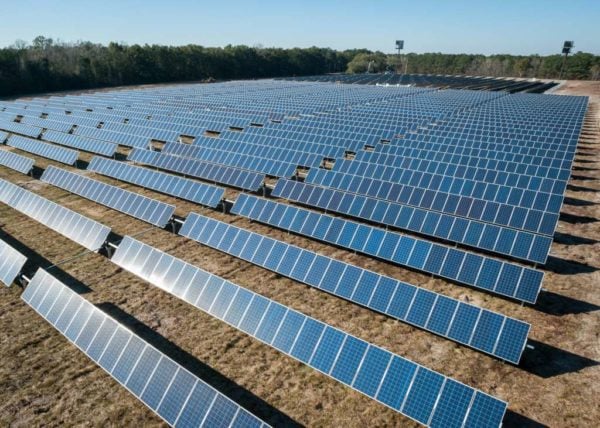
Solar panels could be coming soon to the rooftop of Reston Community Center.
The Fairfax County Board of Supervisors will host a public hearing to discuss the issue on Oct. 20 at 3:30 p.m.
Sigora Solar hopes to install solar panels to generate on-site electricity on several county sites, including RCC’s Hunters Woods location (2310 Colts Neck Road).
If approved by the board, Sigora Solar would sign a solar power purchase agreement with county entities. The company would design, install, permit and operate the rooftop solar panels and sell the generated electricity to facilities like RCC at a fixed rate.
In meeting materials, county staff indicated that the agreement would allow the county to purchase on-site renewable energy “with little or no upfront or operational costs.”
“As the average cost of utility-delivered electric power is expected to increase over time, the savings are expected to increase, as well.”
Sigora Solar has locations in Virginia and North Carolina.
Photo via Unsplash

A report by a subcommittee of the county’s Joint Environmental Task Force is calling on the county to achieve carbon-neutral status by 2050.
The draft report, which will be discussed at a task force meeting today, offers recommendations on goals for adoption by the Fairfax County Board of Supervisors and the Fairfax County School Board.
Members of the task force’s energy subcommittee met several times between September 2019 and August of this year to formulate the report.
In order to achieve carbon-neutral status, the report recommends reducing emissions by 50 percent by 2030 and a net-zero energy commitment for all new county buildings and major renovation projects.
Here’s more from the report on the next steps:
1. Carbon emissions: Achieve 50% emissions reductions by 2030, as compared to the 2019 baseline.
2. Clean renewable energy: Produce 25% of the County energy use from in-County renewable energy generation by 2030, and 50% by 2040, using 2019 energy use as the baseline.
3. Building Energy Performance Standards for existing buildings: Decrease total energy usage from all County facilities by 25% by 2030 and 50% by 2040, as compared to the 2019 baseline.
4. Net Zero Energy Commitment: All new County buildings and major renovation projects beginning planning and design in 2021 and after must achieve ‘Net-Zero Energy’ (NZE) performance as defined below, unless County staff advises the Board prior to the 30% design phase why a project cannot meet the NZE standard.
The report urges the county to coordinate with other organization in order to inventory all potential solar sites, options for geothermal installations, and the launch of a communications campaign about energy and emissions.
The county is currently in the midst of developing its first Community-wide Energy and Climate Action Plan.
Photo via Unsplash

Solar energy panels will be coming to dozens of Fairfax County public schools and facilities following the launch of a large-scale renewable energy initiative this week.
In a Tuesday release, the county has unveiled multiple solar power purchasing agreements with service providers, an agreement that allows the government to purchase solar-generated electricity from companies that install, maintain and operate solar power generation systems on county property.
County officials expect the new initiative could result in more than $60 million in electricity cost avoidance over the terms of the contracts. They expect the contracts to generate around 1.7 million megawatt-hours of clean renewable energy — equivalent to electricity used by more than 213,000 homes annually.
In a statement, Fairfax County Executive Bryan Hill said the initiative was “a major step toward a more sustainable energy future.”
“Fairfax County is striving to promote and encourage the use of renewable energy as we reduce our carbon footprint. We are committed to making choices around energy resources that benefit the residents of Fairfax County now and in the future,” Hill wrote.
Here’s more from the Fairfax County Public School officials:
“The notification of the award is another successful point in our journey to move FCPS toward increased adoption of renewable energy sources,” according to FCPS School Board Chair Karen Corbett Sanders. “Our ongoing sustainability efforts are worthy of highlighting. FCPS has achieved an annual reduction of 14.5 percent in total energy use division-wide since 2014, a cost savings of more than $31 million. Our move toward solar reinforces the School Board’s commitment to our environmental stewardship responsibilities. Pursuant to School Board policy, FCPS will continue to take bold, innovative and sustained actions to help our country achieve climate stabilization. There are still many issues to navigate as we move forward with solar energy efforts that will require cooperation at all levels of government to ensure success.”
“We’re excited to be partnering with the County in a movement that’s good for our students, families and our environment, “said Fairfax County Public Schools Superintendent Scott S. Brabrand. “Lower energy costs through solar power purchase agreements will enable FCPS to save millions of dollars while freeing up additional funds for classroom investments. We look forward to working with the County to expand this initiative to as many FCPS schools and facilities as possible. Our solar investment will also become an amazing learning lab for our students to reinforce the value and sustainability of solar energy.”
The school system was one of the first regional school districts in the country to install equipment to capture solar energy. Terraset Elementary School used solar heat collector tubes to capture energy from the sun when it opened in 1977.
The following schools in the area are being considered for solar modifications:
- Coates Elementary School
- Hunters Woods Elementary School
- Lake Anne Elementary School
- South Lakes High School
- Sunrise Valley Elementary School
- Terraset Elementary School
Photo via Unplash
Commemorative Bricks Available for Purchase — The Reston Historic Trust & Museum is selling commemorative bricks, which are installed at Lake Anne Plaza, for up to $250. Bricks are ordered and installed one time per year. [Reston Historic Trust & Museum]
Dominion Energy to Build Northern Virginia’s Largest Solar Facility — “Dominion Energy Virginia and the Metropolitan Washington Airports Authority announced Thursday that they will jointly study the possibility of developing a large-scale, 100-megawatt solar energy project at Dulles International Airpor. The project would encompass 1,200 acres at Dulles, and could power 25,000 homes at peak output. Dominion Energy said this project would be one of the largest solar facilities in Northern Virginia.” [WUSA 9]
Herndon Man Charged with Drunkenness and Sexual Battery — Jose Luis Hernandez, 45, was arrested after a juvenile victim reported that the suspect touched him in the genital area, according to police. [Herndon Police Department]
Photo via vantagehill/Flickr
 This is an opinion column by Del. Ken Plum (D), who represents Reston in Virginia’s House of Delegates. It does not reflect the opinion of Reston Now.
This is an opinion column by Del. Ken Plum (D), who represents Reston in Virginia’s House of Delegates. It does not reflect the opinion of Reston Now.
While many of us express concern that we do not see as many solar collectors on Virginia roof-tops as we would like, the Commonwealth is showing significant progress on turning sunlight into electrical energy. As with any major change there are some hazy areas that need to be considered as well.
According to the Solar Energy Industries Association (SEIA) as reported in the August 2018 issue of Virginia Business magazine, Virginia currently ranks 17th nationally with 631.3 megawatts of installed solar capacity. The ranking is a significant jump from 2016 when the state ranked 29th nationally. Even with the advanced standing, only 0.59 percent of the state’s electricity comes from solar. By way of contrast, North Carolina is second in the nation in installed solar capacity with 4,412 megawatts brought about by generous tax incentives. For North Carolina that is nearly five percent of their electricity supply.
Virginia’s future with solar appears bright with 59 notices of intent with the Department of Environmental Quality to install 2,646 megawatts of solar according to the Virginia Business article. Driving the expansion of solar energy is a sharp drop in price from $96 in 1970 to 40 cents per kilowatt this year and an insistence on the part of technology giants like Amazon, Microsoft, Google and Facebook, all of whom have a presence in Virginia, that their electric power come from solar systems. The Grid Transformation and Security Act passed by the General Assembly this year requires 5,000 new megawatts of solar and wind energy to be developed. Included in that total is 500 megawatts of small, roof-top panels.
Middlesex County Public Schools opened this year with two of its three schools powered by solar energy. Although a small, rural school system, Middlesex has the largest ground-mounted solar system of any school division in the state and is expected to save over two million dollars per year. Excess electricity generated is sent to the grid for credit for any electricity the schools takes from the grid at night through a net-metering arrangement.
Some shadows along the way can be expected with such a massive shift in the way electricity is produced. It takes about eight acres of land for each megawatt produced. Solar farms take up large amounts of land. Just last week the Culpeper County Board of Supervisors voted to deny a conditional-use permit for a 178-acre utility scale solar facility in the County. The supervisors indicated that they had questions about the project for which they did not receive adequate answers. One factor is likely to have been the results of a study by the American Battlefield Trust that indicated the project would be visible from some of the half-dozen signal stations around Culpeper County that were used during the Civil War to detect troop movement. The County depends on a high level of tourism based on its Civil War battlefields and apparently does not want to jeopardize its attraction to Civil War buffs.
The clouds will pass, and Virginia is on its way to a bright future with solar energy.
File photo

(Updated 1:36 p.m. to remove an event that has already passed)
Warming up to solar? – Fairfax County is holding a free information session today, and will be offering real estate tax credits, solar energy systems discounts, and more to home and business owners. (WTOP)
The throwback comments section – A Reston resident had their Letter To The Editor published in The Washington Post. The topic? The split between Reston and the rest of Fairfax County about density and proposed growth. (The Washington Post)
That’s a lot of butts – Reston business Waitbusters hit 50,000 customers seated since launching their software about a year ago. (Restaurant News)
Everyone’s a critic – A theater review of Reston Community Player’s Thoroughly Modern Millie. Sounds like it was a good time. (Maryland Theatre Guide)
We’re taking a hiatus – Our morning newsletter will be taking a break through May 10, as the editor is away. ARLnow’s assistant managing editor, Bridget Reed Morawski, will be stepping in to cover Reston.
The photo in the morning newsletter was provided with a caption that it is a Great Blue Heron. Another reader has chimed in to say that it is actually a Great Green Heron. Additionally, the Reston editor will be returning May 10, not May 8.
Photo courtesy of Flickr user vantagehill.


